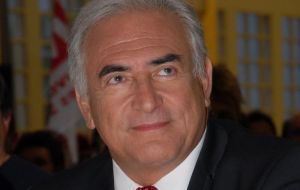MercoPress. South Atlantic News Agency
IMF warns of “third wave of the crisis”, rising unemployment
 Dominique Strauss-Kahn says recovery will be sluggish
Dominique Strauss-Kahn says recovery will be sluggish Policy action to combat the worst economic crisis since the Great Depression is working, but governments should not relax stimulus measures until recovery takes hold and unemployment levels recede, the head of the International Monetary Fund says.
Speaking to reporters in London after a two-day meetings of finance ministers and central bank governors of advanced and emerging market countries, Dominique Strauss-Kahn said signs of recovery could be seen, but unemployment would continue to rise.
“We are seeing the third wave of the crisis, which is rising levels of unemployment,” Strauss-Kahn told reporters. The first two waves were the financial crisis and the consequent global economic crisis.
“Imagine the worker in Germany or France who will lose his job in the months ahead. For that worker the crisis is not behind him, but still ahead,” he said at a press conference following the meeting of the G20 ministers.
The IMF has said the global economy appears to be emerging from the worst financial and economic crisis in the post-war period, but is emphasizing that the recovery will be sluggish and that a jobless recovery remains a risk. Unemployment could go on rising for the next year.
Given the fragility of the recovery, Strauss-Kahn—reflecting his earlier remarks at the Bundesbank in Berlin on September 4—said that policymakers should err on the side of caution as they decide when to exit from their crisis response policies, although governments should develop their exit plans now so that they are able to build public support and act when the time is right.
G-20 ministers “all recognized today that even if we need to discuss our exit strategy, it’s not the time to implement it. It’s time to go on supporting demand until private demand is strong enough so that public demand can be reduced,” he said.
The meeting was held to prepare for a summit of G-20 leaders set for later in September in the U.S. city of Pittsburgh. G-20 ministers said in a communiqué that unprecedented and concerted global policy action had arrested the decline, and financial markets were stabilizing.
They said they would endeavor to combat joblessness by promoting employment through structural policies, active labor market policies, training and education. They emphasized that recovery would need to be complemented by a rebalancing of global demand.
Strauss-Kahn praised the level of cooperation between the G-20 and the Fund and saw the ministers’ meeting as a success and a good preparation for Pittsburgh. The joint action by the G-20 earlier this year had “avoided a possible catastrophe.”
On strengthening regulation of the financial sector, where the crisis erupted, Strauss-Kahn said much had been done, but more concrete measures were needed on capital requirements for banks, cross-border issues, and compensation for financial executives.
Although a risk-taking culture has been the hallmark of major financial firms—with generous bonuses rewarding high short-term profits, and insufficient regard for longer-term risks—policymakers recognized that excessive risk-taking contributed to problems of procyclicality and hence was an important factor in the crisis.
“I worry that as the financial sector emerges from crisis, a “business as usual” mentality may prevent serious progress from being made,” he said.




Top Comments
Disclaimer & comment rulesCommenting for this story is now closed.
If you have a Facebook account, become a fan and comment on our Facebook Page!